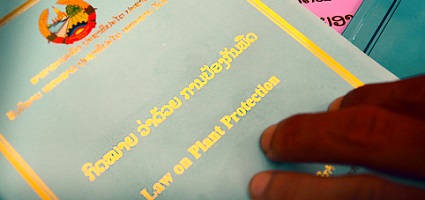New legislative framework for Lao PDR agricultural trade and food safety

In the words of Dr. Thongloun Sisoulith, Deputy Prime Minister of Foreign Affairs, October 26th, 2012 was an “historical moment for the Lao PDR government and its people”. His speech at the General Council of the World Trade Organization (WTO) headquarters in Geneva that day culminated a 15-year negotiation process to approve Lao PDR’s access to the Organization. Official membership would not come until February 2013, after ratification by the country’s National Assembly.
Since the early stages of its application in 1997, Lao PDR embarked upon profound domestic legislative reforms to comply with WTO’s trade agreements and principles. The accession process was complex and lengthy; yet, it was a key driver for the considerable adjustments to legislation in many sectors, including agricultural trade and food safety. Over l90 laws and regulations were enacted. The revision of sanitary and phytosanitary measures (SPS) legislation was led primarily by the Ministries of Agriculture and Forestry, and of Public Health, with support from the Ministry of Industry and Commerce.
Under the Trade Development Facility (TDF), a multi-donor trust fund contributed by Australia, European Union and Germany and administered by the World Bank, FAO was requested to support the Lao Government to strengthen its SPS regulatory framework.
Among the activities carried out was a review of all existing SPS legal instruments, and an assessment of compliance with international obligations and standards. Legislation amendments and new drafts were developed, and international standards were incorporated while adhering to the Lao legislative tradition.
From November 2011 to March 2013, during the first implementation stage of the project, a total of 15 pieces of legislation were produced. In the first 6 months of that time, four texts were approved.
Today, as part of a post WTO-accession agenda, the work towards enhanced agricultural trade and food safety continues, this time with a greater emphasis on trade facilitation and strengthening of the private sector, through a second phase of the Trade Development Facility (TDF-II)— a multi-donor trust fund financed by Australia, European Union, Germany, Ireland and the World Bank.
“Lao PDR requires an SPS regulatory framework that is cognizant of the implications of its recent entry into the WTO system, compliance with the SPS Agreement, and greater economic integration through the ASEAN Economic Community in 2015 ” said Ms. Ambra Gobena, project team leader.
As well as compliance with WTO obligations, preparation for greater economic integration in ASEAN is also a priority for Lao PDR. The agro-food sector has experienced the fastest growth in the region.
The revised legislative framework provides an opportunity for Lao PDR to further the access of its products to foreign markets as well as to create a domestic environment that is conducive to investment, both domestic and foreign. As Ms. Gobena underscores, “It is legislation that underpins all the activities of the SPS management system. While addressing and fulfilling its international obligations, Lao PDR can use the opportunity to make its exports more competitive, attract investors, and most importantly, to create a system that enhances safe and good quality agricultural and food products.”
